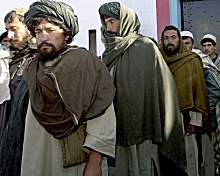Jamaat-i-Islami chief Qazi Hussain Ahmed has said that President Pervez Musharraf is part of "global terrorism unleashed by the United States and its western allies", and not a partner to anti-terrorism movement. He claimed this while making an opening sermon at his party's three-day general congregation at the Azakhel Park, some 20kms northeast of Peshawar in his own constituency, Nowshera. Thousands of JI members, activists and sympathizers, who converged here from every district of the country, listened to their chief's captivating remarks, who was too critical of President Musharraf's pro-US stance on various issues.
| "too critical"? For once the Pakistani transliterator gets one right. |
The JI chief alleged that the US and its allies had made lives of the people of Afghanistan, Iraq, Chechneya, Palestine and held Kashmir miserable. The oppressed Muslims were being slaughtered across the globe, but the rulers of Muslim countries were silent over these atrocities, he lamented.
"Oh woe is us! The evil Jooooos and 'Merkins slaughter us across the globe! Is there no brave Muslim who will step forward and deliver us?!"
"Duuuh, Qazi, why don't you deliver us?"
"Oh Mahmoud, I couldn't, but if you insist, hokay, I'm here!" |
Contrary to the wishes of Muslims, he said, Gen Musharraf was carrying out the political agenda of the United States and making his own countrymen victim of terrorism in South Waziristan and Balochistan. This state of affairs was alarming as tribal people could retaliate to their own forces, which were defenders of the country's borders, Qazi Hussain said. He said the US was waging a war against weak and poor countries to impose its political hegemony on them. The Muslims, who believed in brotherhood, rule of law and justice, could not be dubbed terrorists.
| "P'shaw! Can't be us, we're just peace-loving Muslims! Why, Mahmoud here wouldn't hurt a fly, ain't that right Mahmoud!" |
Instead, he added, the secular and infidel forces were responsible for world's chaos, terrorism and people's genocide.
He said Gen Musharraf was not a real representative of Pakistani people, "rather he was a usurper who had assumed power at gunpoint." He had served the interests of imperialism and exploiters, who had introduced the new world order. The United States wanted to rob Muslims of their faith and dilute their commitment to Jihid "for which Gen Musharraf had tried to change the curriculum in Pakistan, but the JI foiled that bid," he added. The Jamaat chief observed that the US wanted to deprive Pakistan of its nuclear assets, but patriotic Pakistanis would defend them at all cost. It was the US which had bombed out thousands of innocent Japanese in Hiroshima and Naga Saki in 1945 to extend its military-cum-political writ up to Asia, he added.
| Qazi does seem to have missed the obvious lesson of Hiroshima and Nagasaki, hasn't he. |
Referring to the 'uniform' issue, he said it was the only and respectable way for Gen Musharraf to shed his uniform by Dec 31, otherwise people would force him (Musharraf) out of the presidency. "We will not tolerate him even for a day after Dec 31". He defended the 17th amendment which, he said, had bound him (Musharraf) to quit his one office. He urged the Alliance for the Restoration of Democracy (ARD) and the Pakistan Oppressed Nations Movement (PONM) to cooperate with the MMA and prepare themselves for a protest movement against Gen Musharraf.
Qazi Hussain Ahmed said they would not allow any 'adventurist' in the future to topple any government and seize power. It was MMA's commitment with the nation that it would not accept any military rule in the future. "We want a constitutional government, not a military one, for the interest of the country," he added. He said the United Sates wanted to establish India's hegemony in the region for which it had forced Pakistan to back out from its principled stand on Kashmir. Earlier, Sheikh Mohammad Siamus Saleh, a former imam of the Al-Aqsa mosque, delivered the Friday sermon and led the prayers at Azakhel's open ground.
Note that Jamaat-i-Islami is a local branch of terrorist outfits throught the world. Sheikh Mohammad Siamus Saleh, a former imam of the Al-Aqsa mosque, delivered the Friday sermon and led the prayers at Azakhel's open ground that means that Musharraf is not doing enough to prevent the terrorists from coming in Pakistan. |
 QUETTA: Mahmood Khan Achakzai, president of the Pakistan Oppressed Nations Movement (PONM), on Saturday accused Islamabad of being involved in the armed interference in Kabuls affairs. At a public gathering in Pishin district, Achakzai said that Islamabad was deliberately causing regional devastation by directly interfering in the affairs of the Karzai-led government and supporting armed groups. He appealed to religious Afghan leaders to hold dialogue with Maulana Fazlur Rehman and Qazi Hussain Ahmed to determine whether the acts of interference were jihad or terrorism.
QUETTA: Mahmood Khan Achakzai, president of the Pakistan Oppressed Nations Movement (PONM), on Saturday accused Islamabad of being involved in the armed interference in Kabuls affairs. At a public gathering in Pishin district, Achakzai said that Islamabad was deliberately causing regional devastation by directly interfering in the affairs of the Karzai-led government and supporting armed groups. He appealed to religious Afghan leaders to hold dialogue with Maulana Fazlur Rehman and Qazi Hussain Ahmed to determine whether the acts of interference were jihad or terrorism. 
 KARACHI: Justice Amir Hani Muslim of the Sindh High Court, who is also the administrative judge for the anti-terrorism courts of Karachi region, remanded seven activists of the
KARACHI: Justice Amir Hani Muslim of the Sindh High Court, who is also the administrative judge for the anti-terrorism courts of Karachi region, remanded seven activists of the  Pakhtoon leader
Pakhtoon leader